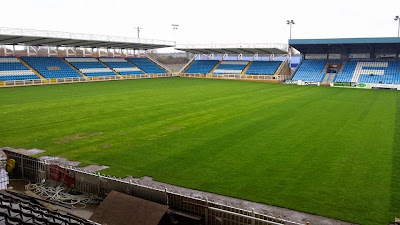Rovers' start to the 2002 season had not been as good as expected, and after the release of Ian Fairhurst, in came Andy Kelly, who had previously been in charge of Wakefield Trinity. Kelly had a good coaching pedigree, having largely over-achieved with Wakefield in Super League. He was then the victim of some off-field mayhem at Belle Vue in 2000, losing his job in harsh circumstances. Featherstone Rovers was his chance to get back into coaching and he took over a side that had performed poorly in the National League Cup, but were 4th in the league after a decent start to the season.
Kelly’s first game in charge was a memorable affair, a high scoring ding dong battle against potential play-off rivals Hull KR which ended in a 46-40 victory. In a single game, the new coach could see his challenge. With the likes of Rooney, Newlove and the creative Chapman he had plenty of attacking potential, but the defence and 80 minute concentration needed work. Rovers actually won nine of their first 13 games under Andy Kelly, including some free scoring displays against Keighley, Hunslet and Workington, but also a couple of heavy defeats at Leigh and at Batley. This left Rovers in 5th spot on the ladder, for the fourth consecutive season. Nothing if not consistent. Our play-off hopes were ended at home by Batley, a most disappointing way to go out.
In the off season Andy Kelly had to face up to some real challenges. Rovers lost their top three try scorers from 2002 Rooney, Newlove and Lowe to Super League clubs. To plug the gaps Kelly brought in Flynn, Brown and O’Meara to the backs with Carl Briggs at scrum-half. It also allowed Kelly to introduce a tremendous number of young players from the junior set up in 2003. During the course of that relatively unsuccessful season we saw Jon Presley, James Ford, James Houston, Andy Bailey plus a number of other youngsters given their senior debuts. Most noticeable perhaps was the introduction in April of Richard Whiting who did enough in less than 20 games to win a Super League contract. Despite the low league position finish, Kelly does deserve credit for being bold enough to introduce so many youngsters, a good number of whom have gone on to enjoy extended National League careers.
After unbroken seasons of playoff rugby it came as a bit of a shock to the club not to make the playoffs. After a solid start and a top six position for most of the campaign six defeats in the last seven games, including a desperately disappointing final day defeat at home to Oldham, cost us an outside shot at the title and inevitably cost Kelly his job. No leeway can be made for the fact that Rovers were clearly in a transitional phase in the competitive world of RL coaching.
After leaving Featherstone Andy Kelly coached at Gateshead, Dewsbury and also Ireland at the 2008 World Cup.
Andy Kelly’s coaching record:
2002: Won 11 Lost 5
2003: Won 16 Lost 16
Total: Won 27 Lost 21 = 56.25%














